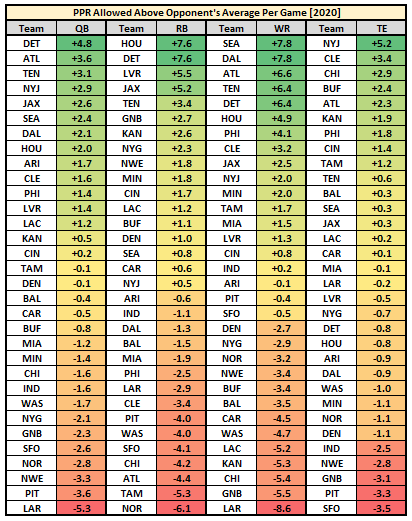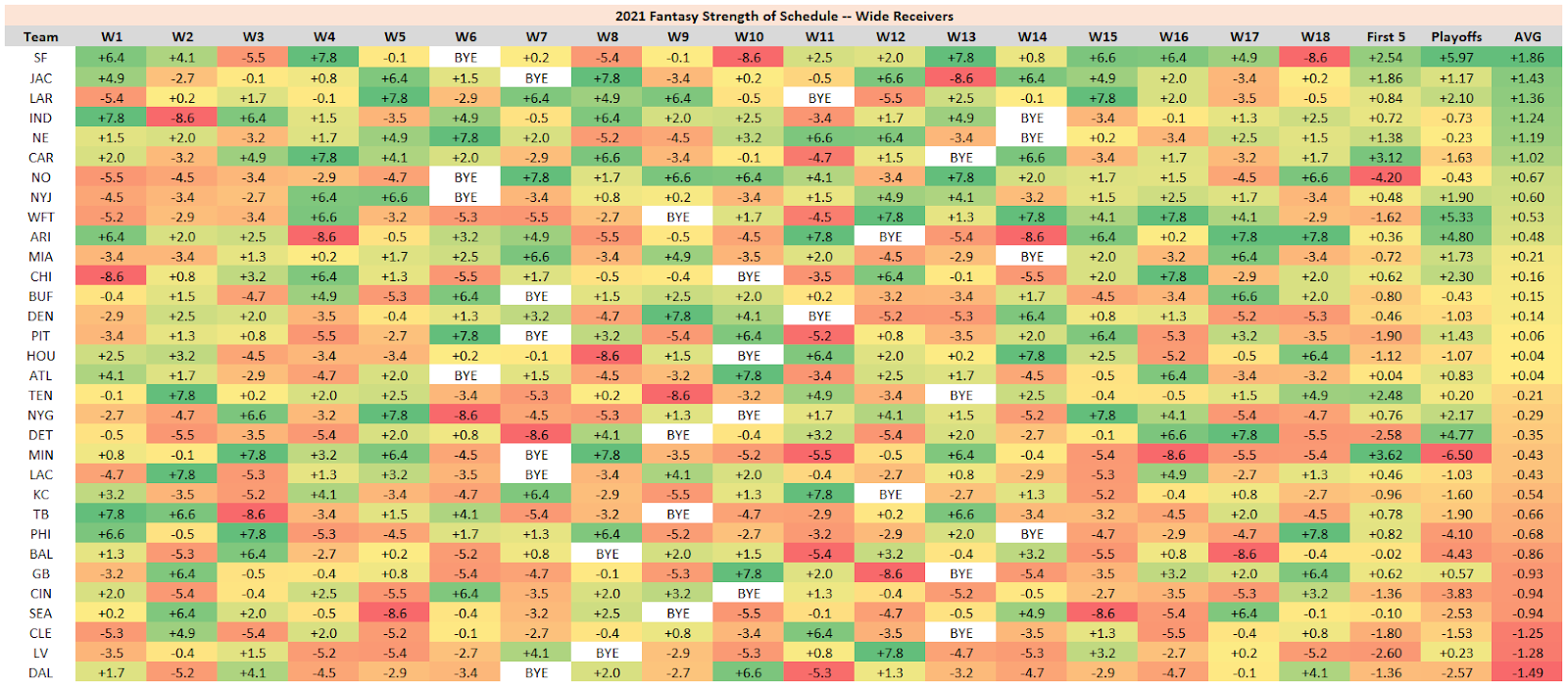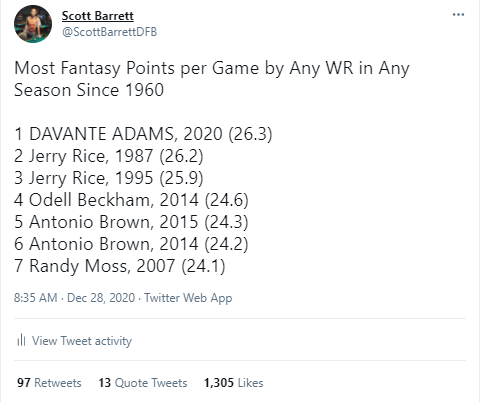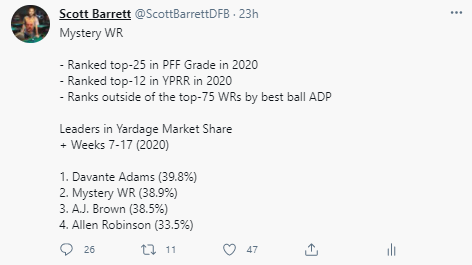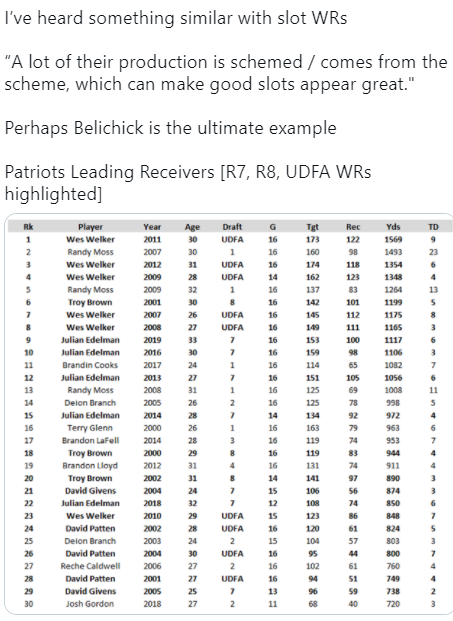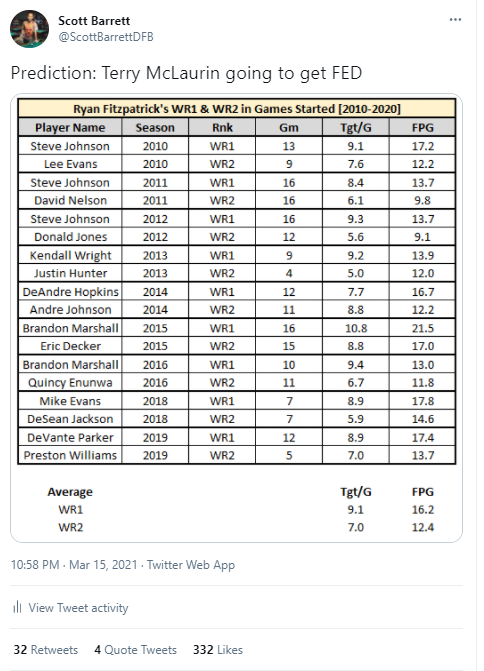Other Positions: Quarterbacks Running Backs Tight Ends
Never Bury the Lede: The difference between Deebo Samuel’s schedule last year and his schedule this year was the difference between him finishing 46th and 33rd in fantasy points per game.
Which wide receivers have the toughest or easiest fantasy schedules this year? Which wide receivers had the toughest or easiest schedules last year? Or, what about the toughest or easiest schedules in the fantasy postseason? Or to start the season? Which wide receivers saw their schedules improve the most or least? How big of an impact was that change in schedule? Can we quantify that change in real terms using fantasy points?
Luckily for our subscribers, we can answer all of these questions and more. But in order to do so, we first had to quantify strength of schedule. This is typically done by calculating a defense’s FPG allowed average, and then looking at the average for all players over a full season. This will also be our approach; however, we’ll be taking things one step further – we’re going to use a control for the opposing offense by measuring FPG over an opponent’s average.
For instance, last season, opposing wide receivers averaged +7.8 fantasy points per game over their season-long average when facing Seattle, which ranked worst in the league. (Seattle was the most favorable fantasy matchup for opposing wide receivers; worth, on average, an additional 7.8 fantasy points per game.) On the opposite end of the spectrum, wide receivers fell short of their season-long average by 8.6 points when facing the Rams, which ranked best in the league. (The Rams were the toughest fantasy matchup for opposing wide receivers.) Calculating these numbers for all teams and then applying the full-season average for all players quantifies in real terms which players had the easiest and most difficult schedules for fantasy last year. We can also use these numbers to project out strength of schedule for each team and each position in 2021.
While this methodology isn’t perfect — of course roster turnover and coaching changes will complicate things — strength of schedule doesn’t not matter. This data is still far more actionable than it is not. In fantasy football — like in poker — there may only be small edges to be gained, but those small edges can be compounded to yield a massive advantage. And they must be taken advantage of … and are, by the most dominant players. That’s the case with strength of schedule. It’s another small edge to be realized, and at the polar extremes, it might matter a lot more than you’d expect.
Last season, Deebo Samuel had the toughest schedule among all fantasy wide receivers. His average matchup was worth -3.67 [team wide receiver] FPG. Because he was responsible for 36% of the fantasy points generated by San Francisco’s wide receivers last year (in games active), we can say that – adjusted for strength of schedule, or if he had a perfectly average strength of schedule last year – he would have scored an additional +1.30 fantasy points per game. This would have been the difference between him finishing 46th in fantasy points per game (11.5) and 38th (12.8). Looking forward, Samuel’s schedule is much-improved (most-improved at the position), very soft (softest at the position), and worth an additional +0.66 fantasy points per game in real terms (adjusting for usage). Essentially, if he had this schedule last year, he should have scored 13.5 fantasy points per game, which would have ranked 33rd-best.
Clearly, strength of schedule – something totally outside of a player’s control and entirely due to luck – can have a big impact for fantasy.
Best Overall Schedule (2020)
1. T.Y. Hilton (+2.26)
2. Michael Pittman (+2.01)
t3. Adam Thielen (+1.81)
t3. Justin Jefferson (+1.81)
5. Tee Higgins (+1.63)
Worst Overall Schedule (2020)
1. Deebo Samuel (-3.67)
2. Denzel Mims (-3.43)
3. Bryan Edwards (-2.54)
4. KJ Hamler (-1.97)
5. Mike Evans (-1.87)
2021 Schedule
PDF Download available here.
CSV Download available here.
Best Overall Schedule (Weeks 1-17)
1. San Francisco WRs, Average Matchup: +1.86
2. Jacksonville WRs (+1.43)
3. Rams WRs (+1.36)
4. Indianapolis WRs (+1.24)
5. New England WRs (+1.19)
Worst Overall Schedule (Weeks 1-17)
1. Dallas WRs (-1.49)
2. Las Vegas WRs (-1.28)
3. Cleveland WRs (-1.25)
4. Seattle WRs (-0.94)
5. Cincinnati WRs (-0.94)
Off to a Hot Start (First Five Weeks)
1. Minnesota WRs (+3.62)
2. Carolina WRs (+3.12)
3. San Francisco WRs (+2.54)
4. Tennessee WRs (+2.48)
5. Jacksonville WRs (+1.86)
Slow Starters (First Five Weeks)
1. New Orleans WRs (-4.20)
2. Las Vegas WRs (-2.60)
3. Detroit WRs (-2.58)
4. Pittsburgh WRs (-1.90)
5. Cleveland WRs (-1.80)
Best Playoff Schedule (Weeks 15-17)
1. San Francisco WRs (+5.97)
2. Washington WRs (+5.33)
3. Arizona WRs (+4.80)
4. Detroit WRs (+4.77)
5. Chicago WRs (+2.30)
Worst Playoff Schedule (Weeks 15-17)
1. Minnesota WRs (-6.50)
2. Baltimore WRs (-4.43)
3. Philadelphia WRs (-4.10)
4. Cincinnati WRs (-3.83)
5. Dallas WRs (-2.57)
Schedule Change (In Real Points)
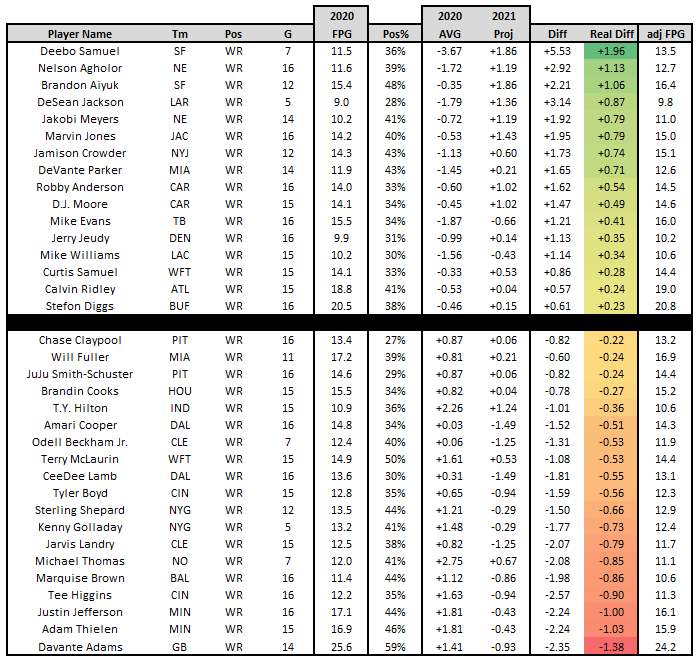
Most Improved Schedule
1. Deebo Samuel (+1.96)
2. Nelson Agholor (+1.13)
3. Brandon Aiyuk (+1.06)
4. DeSean Jackson (+0.87)
5. Jakobi Meyers (+0.79)
Least Improved Schedule
1. Davante Adams (-1.38)
2. Adam Thielen (-1.03)
3. Justin Jefferson (-1.00)
4. Tee Higgins (-0.90)
5. Marquise Brown (-0.86)
Thoughts / Notes / Dank Stats
- No wide receiver will benefit more from an improved schedule this year than Deebo Samuel. (Explained in more detail in the introduction.)
- And fellow San Francisco wideout Brandon Aiyuk isn’t far behind Samuel. His schedule ranks third-most improved, worth an additional 1.06 FPG to his 2020 average in real terms. Essentially, if he had this schedule last year, he would have finished 13th instead of 19th in FPG. In addition to having the best overall schedule (+1.86), San Francisco WRs also have the league's softest playoff schedule, and by a wide margin (+5.97). Samuel is intriguing, but Aiyuk is the far more enticing option for fantasy purposes. From Weeks 7-15 (so, prior to the ankle injury he suffered in Week 16 which caused him to sit out Week 17), Aiyuk ranked third among all WRs in FPG (20.3). Only Davante Adams (28.5) and Tyreek Hill (27.5) ranked higher.
- Justin Jefferson and Adam Thielen ranked (respectively) 10th (17.1) and 11th in FPG (16.9) last season. But if they had this schedule last year, they would have ranked only 15th- (15.2) and 17th-best (14.9).
- Michael Thomas would be an ideal in-season trade target if he struggles to get going early in the year. Saints WRs have the league's toughest strength of schedule through the first five weeks of the season (-4.2) but the league's softest schedule after their Week 6 bye (+3.19, 2X softer than the next-closest team).
- Davante Adams averaged 26.3 FPG across the fantasy season (Weeks 1-16) last year, which ranks most by any WR since 1960. However, Adams did benefit from one of the league's softest schedules last year (+1.41), and it's about to get a lot worse (sixth-toughest overall). Still, even with the schedule dropoff factored in (-1.38 FPG in real terms), he’s still head-and-shoulders above any other WR.
- Nelson Agholor has the second most-improved schedule this season, and fellow New England wideout Jakobi Meyers ranks fifth most-improved. I think both are highly intriguing, and especially once Mac Jones (inevitably) takes over as the starting QB. New England made Agholor the 22nd-highest-paid player at his position this offseason, and Meyers was a lot better last year than he’s being given credit for. He ranked 12th in YPRR (2.24), 25th in PFF grade, and (from Week 7 on) ranked second-best in yardage share (38.9%). Keep a close eye on who is getting the majority of reps in the slot this preseason, as HC Bill Belichick’s starting slot WR has been a borderline fantasy cheat code, and a focal point of the offense, for over two decades now. (For clarity, Meyers was the team’s starting slot WR last year and only saw real playing time following Julian Edelman's season-ending injury. Agholor played mostly outside for the Raiders last season but played predominantly out of the slot when he was in Philadelphia.)
- DJ Chark finished 43rd in FPG last year (11.8) and 20th in 2019 (14.9). The upgrade from Gardner Minshew/Mike Glennon/Jake Luton to Trevor Lawrence is probably priced into his ADP (WR29), but maybe not the schedule upgrade. Chark's schedule was fairly soft last season (+0.84), but his overall schedule ranks second-best this year (+1.43).
- Tee Higgins played on only 15 snaps in Week 1 and Joe Burrow suffered a season-ending injury in Week 11. Between those two games, Higgins averaged 15.6 FPG, which would have ranked 16th-best if over the full season. Burrow should be back for Week 1. That’s the good news. The bad news is his schedule is about to get a lot more difficult, worth -0.90 FPG off his 2020 schedule in real terms (fourth-worst). That, and the Bengals just spent a top-5 pick on the next A.J. Green in Ja’Marr Chase.
- Amari Cooper and CeeDeee Lamb both ranked top-12 among WRs in fantasy points through the first five weeks of the season (prior to Dak Prescott’s IR designation). Getting Prescott back will be huge for both WRs, but they also have the league's toughest overall schedule this year (-1.49).
- TY Hilton was an abject disaster last season, and those numbers look even worse when considering he had the league's softest strength of schedule last year, worth an additional 0.80 FPG off of his average in real terms. Although Hilton averaged 17.1 FPG over his final six games, and Carson Wentz (a far superior deep-ball passer to Philip Rivers) should be an upgrade for his specific skillset, he’s still very hard to trust entering his age 32 season and coming off back-to-back career-low seasons by YPG (33% worse than his prior career average).
- Terry McLaurin's schedule is a bit tougher this year (-0.53) but he also has the league's second-softest playoff schedule (+5.33). McLaurin finished 20th in FPG last year (15.1), despite league-low levels of QB play (Alex Smith/Dwayne Haskins/Taylor Heinicke) and playing through two (!) high-ankle sprains. For clarity, McLaurin ranked 10th in FPG (16.8) prior to first popping up on the injury report in Week 11. Getting back to full health and the signing of veteran QB Ryan Fitzpatrick, I think, will do wonders for McLaurin in 2021.


